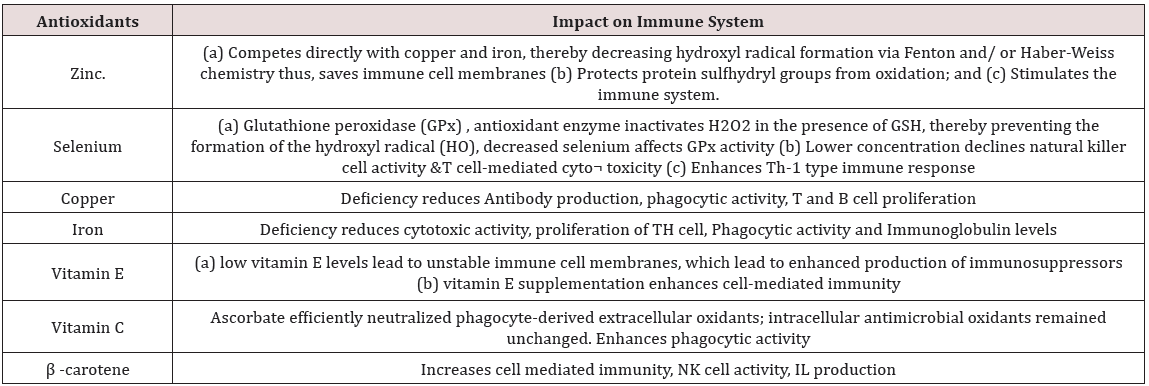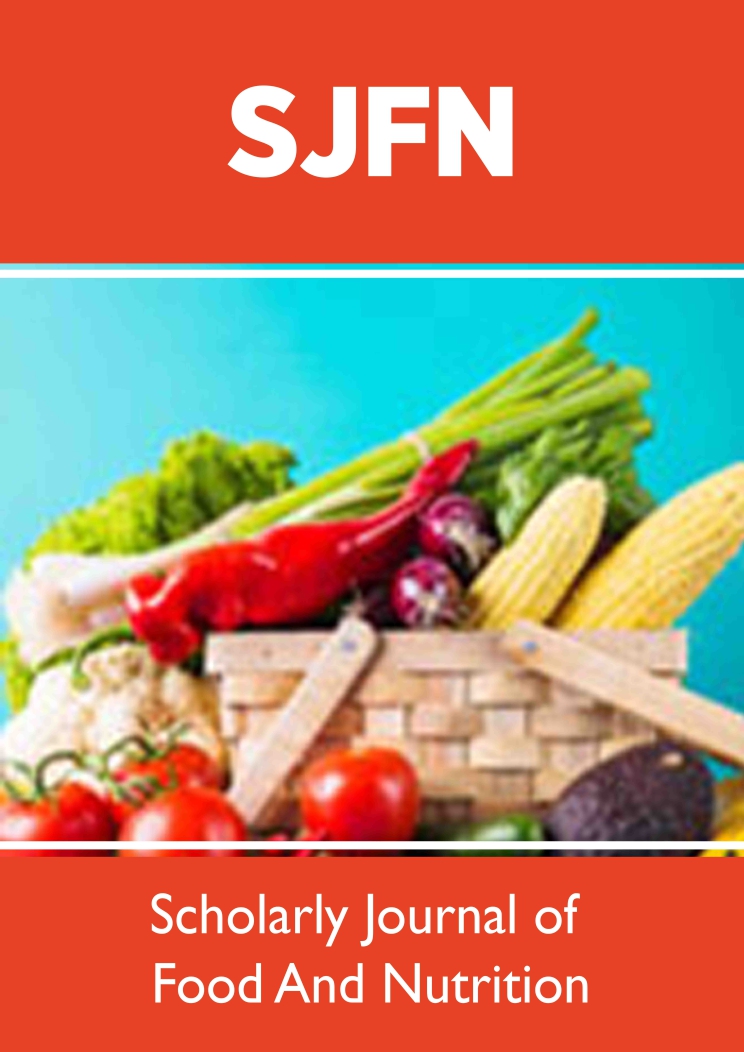
Lupine Publishers Group
Lupine Publishers
Menu
ISSN: 2638-6070
Mini Review(ISSN: 2638-6070) 
Reduction of Immune Related Disease with Diet Rich in Antioxidants
Volume 1 - Issue 2Tulika Mishra1* and Sneh Lata2
- 1School of Medical Science, Xavier University, Santa Helenastraat 23, Oranjestad, Aruba
- 2Department of Biotechnology, Chandigarh University, Gharuan, Mohali, India
Received: May 25, 2018; Published: May 30, 2018
*Corresponding author: Tulika Mishra, School of Medical Science, Xavier University, Santa Helenastraat 23, Oranjestad, Aruba
DOI: 10.32474/SJFN.2018.01.000107
Abstract
Immune system is an intricate mechanism, the functioning of which maintains a balance between various diseases. The proper functioning of Immune system is dependent upon the healthy, nutritional diet which thereby helps in combating many diseases and pathogen attack.
Introduction
The nutritional value of the food that we consume plays a very important role in combating many diseases. Industrialization, urbanization, economic and social development has brought to prompt changes in diets and life style. Consequently people have become more prone to cancer, hypertension, strokes etc due to inappropriate diet. One of the major causes of many of these diseases is oxidative stress caused by disturbance in the balance between antioxidants and prooxidants. Prooxidants or free radicals are the species capable of independent existence that contain one/more unpaired electrons [1]. Free radicals not only contribute to the elimination of infected cells, but when present in higher concentrations react with cellular DNA, proteins, lipids and other macromolecules. The disease such as brain dysfunction, cancer, autoimmune pathologies, gastrointestinal inflammation and ulcers [2], heart diseases and immune decline could be due to these free radicals [3]. In physiological condition, the human body can compensate for a mild degree of oxidant stress and remove oxidatively damaged molecules by activating antioxidant enzymes like superoxide dismutase, catalase, glutathione peroxidase, etc. Thus, owing to their ability to reduce oxidative damage.
The deleterious impacts of these free radicals can be reduced down by adding natural antioxidant rich diet in our daily routine. It is tempting to speculate that the restorative and rejuvenating power of these antioxidants be due to their action on the immune system which is responsible for the protection of the organism from extraneous substances and maintaining homeostasis. Nutritional Immunology arose largely during the early 20th century. The recognition of various vitamins and advancement in the field of Immunology made it possible to study the impact of free radicals on Immune system and thereby generation various diseases and disorders.
Free Radicals and Antioxidants in the Immune System
The immune cell functions such as those involved in the inflammatory response, cytotoxic activity and particularly in phagocytes as regards their microbicidal activity, are specially linked to reactive oxygen species (ROS) generation. However, it is very well known fact that excessive amounts of ROS which are not counteracted by the antioxidant defenses of the cell, can become a source of tissue damage, since free radicals can attack cellular components and lead to death because of the molecular damage resulting from oxidative stress.
Thus, the immune cell functions are strongly influenced by the antioxidant=oxidant balance and, As the Immune cells have high percent of polyunsaturated fatty acids in their plasma membranes and a higher production of reactive oxygen species (ROS), which makes them more sensitive towards the oxidative stress. Additionally, the oxidative stress damages the membrane which in turn affects the defense function and binding of antigen by the immune cells. Antioxidant levels in these cells play a pivotal role in maintaining immune cells in a reduced environment and in protecting them from oxidative stress and preserving their adequate function [4]. The studies have shown that many pathogenic attack, and other diseases are more sever in immunocompromised host. Further the studies has shown that Immune system is very well affected by the deficiencies of other elements also (Table 1) showing the impact of these elements on Immune system.
The data suggests that that antioxidant nutrients commonly includes vitamin E, vitamin C, β-carotene, selenium, copper, iron and zinc improve different immune function exhibiting an important protective role in infections caused by bacteria, viruses or parasites. Fruits and vegetable are the rich source of natural antioxidants. Foods with darker, richer colors like orange, yellow, blue, and red tend to be higher in antioxidants. In addition to these fruits and vegetables, nuts and spices are also a good source of antioxidants. The intake of these antioxidants by many immunocompromised persons or with weakened immune system also showed tremendous results against infections and other pathophysiological conditions.
The results of recent studies emphasized that functional role of antioxidants as depends upon their concentration. Higher levels may leads to adverse effects where as low levels may lead to many diseases. All these antioxidants have been shown to improve the immune functions in vitro and in vivo [5-7]. Furthermore, the inhibition of activation of the nuclear transcription factor NF-kB produced by oxidative stress, which could result in a decrease of free radicals and pro-inflammatory cytokine production hence, showing antinflammatory action of these antioxidants. The imbalance in immune homeostasis leads to many diseases.
Conclusion
Immune system is very well affected by various antioxidants present. The functioning of immune system can be balance by consuming proper antioxidant diet and thereby many health issues can be avoided.
References
- Zhu YZ, Huang SH, Tan BKH, Sun J, Whiteman M, et al. (2004) Antioxidants in Chinese medicines: A biochemical perspective. Nat Prod Rep 21(4): 478-489.
- Repetto MG, Liesuy SF (2002) Antioxidant properties of natural compounds used in popular medicine for gastric ulcers. Braz. J Med Biol Res 35(5): 523-534.
- Aruoma OI (1998) Free radicals, oxidative stress and antioxidants in human health and disease. J. Am. Oil. Chem. Soci. 75(2): 199-212.
- Knight JA (2000) Review: Free radicals, antioxidants and immune system. Ann Clin Lab Sci 30(2): 145-158.
- De la Fuente, M. and Victor, V.M. (2000) Antioxidants as modulators of immune function. Immunol Cell Biol 78(1): 49-54.
- Aruoma OI (2003) Methodological consideration for characterizing potential antioxidant actions of bioactive components in food plants. Mut. Res. 523: 9-20.
- Victor VM, De la Fuente M (2002) N-acetylcysteine improves in vitro the function of macrophages from mice with endotoxin induced oxidative stress. Free Rad Res 36(1): 33-45.

Top Editors
-

Mark E Smith
Bio chemistry
University of Texas Medical Branch, USA -

Lawrence A Presley
Department of Criminal Justice
Liberty University, USA -

Thomas W Miller
Department of Psychiatry
University of Kentucky, USA -

Gjumrakch Aliev
Department of Medicine
Gally International Biomedical Research & Consulting LLC, USA -

Christopher Bryant
Department of Urbanisation and Agricultural
Montreal university, USA -

Robert William Frare
Oral & Maxillofacial Pathology
New York University, USA -

Rudolph Modesto Navari
Gastroenterology and Hepatology
University of Alabama, UK -

Andrew Hague
Department of Medicine
Universities of Bradford, UK -

George Gregory Buttigieg
Maltese College of Obstetrics and Gynaecology, Europe -

Chen-Hsiung Yeh
Oncology
Circulogene Theranostics, England -
.png)
Emilio Bucio-Carrillo
Radiation Chemistry
National University of Mexico, USA -
.jpg)
Casey J Grenier
Analytical Chemistry
Wentworth Institute of Technology, USA -
Hany Atalah
Minimally Invasive Surgery
Mercer University school of Medicine, USA -

Abu-Hussein Muhamad
Pediatric Dentistry
University of Athens , Greece

The annual scholar awards from Lupine Publishers honor a selected number Read More...





